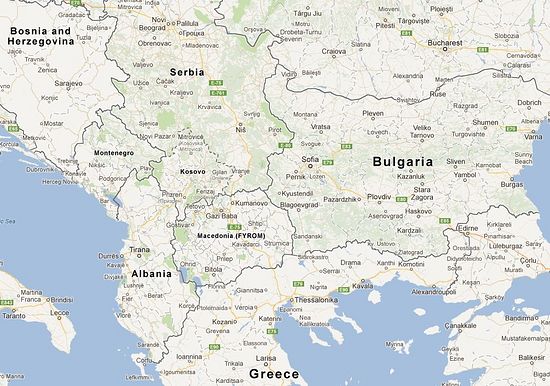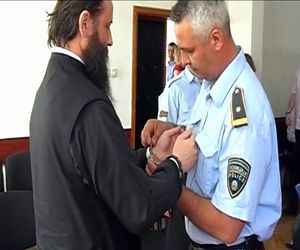The following article by the St. Herman of Alaska Brotherhood, a monastery of the Serbian Orthodox Church, was printed in the Orthodox Word in 2005, after Archbishop Jovan of Ohrid and Metropolitan of Skopje of the Serbian Orthodox Church was imprisoned for the second time. Despite numerous pleas from other Local Orthodox Churches and human rights organizations, the persecutions against Archbishop Jovan and others who have reunited with the Serbian Orthodox Church in Macedonia have not ceased; in fact they have increased.
We present this article in order to provide background on the ecclesiastical situation in the Former Yugoslav Republic of Macedonia.
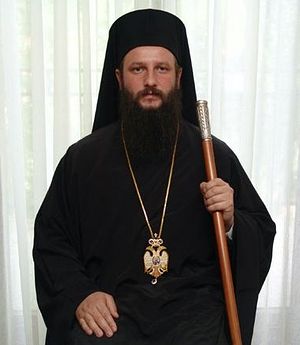 Archbishop Jovan.
Archbishop Jovan.
but Church history is paradoxical—the more the Church
is persecuted, the more followers it gets.
—Archbishop Jovan[1]
1. Introduction
On July 26, 2005, His Eminence Jovan, Archbishop of Ohrid and Metropolitan of Skopje, began serving a two-and-a-half year prison sentence in the Former Yugoslav Republic of Macedonia (FYROM).[2] A month earlier a court of appeals had upheld a lower court ruling that had found him guilty of “inciting national, racial and religious hatred, schism and intolerance.” In reality the government has imprisoned him for entering into communion with the Orthodox Church. According to the Orthodox Archbishopric of Ohrid website, Archbishop Jovan is “the only confessor of the faith who, in modern Europe, has been convicted and put in prison because of his religious beliefs.”
2. The Region of Macedonia
The present Republic of Macedonia covers about a third of the historical region of Macedonia. Situated in the south central part of the Balkan Peninsula, the historical region extends into Greece, Albania and Bulgaria. A number of ancient kingdoms and former empires controlled the lands now known as the Republic of Macedonia. These included the realm of Paionia, the ancient Macedonian kingdom, the Roman and Byzantine Empires, Serbia, Bulgaria, and the Ottoman Empire.
In the fourth century BC, the region came to dominate the Greek city states and, eventually, an area that reached Persia, Egypt and India. This empire, built by Philip II and his son Alexander the Great, quickly disintegrated after the latter’s death, and Macedonia was eventually swallowed by the Roman Empire in 148 BC.
During the first century A.D., the holy Apostle Paul brought the Christian Faith to the southern region of Macedonia (today northern Greece). Christianity then passed into northern Macedonia in the following decades and centuries.
In the fourth century, the Macedonian lands came under the control of Constantinople, the successor to Rome. By the end of the fourth century Christian churches had been built throughout the region. The area was subjected to countless raids by barbarians (Huns, Goths and Avars), who often devastated the churches. This caused much of the Greek-speaking Christian population to find refuge in the east, near Constantinople, and in the well-fortified coastal cities.
In the sixth century St. Justinian, Emperor of Byzantium, made the Macedonian city of Skupi (Skopje) an ecclesiastical center. During the same period Slavic tribes began pouring into the southern Balkans. Many of these tribes settled in the region of Macedonia, which had been previously depopulated by the barbarian raids. By the ninth century Greek was no longer the predominant language, having been replaced by Slavonic, and the Christian Faith had practically disappeared from the land.
The Bulgarians now held control of the region; and with the conversion of their ruler, St. Boris-Michael, Prince of Bulgaria, Christian missionaries once again brought the Faith to the area of Macedonia. At the end of the ninth century, after the repose of the great missionaries to the Slavs, Sts. Cyril and Methodius, two of their disciples, Sts. Clement and Nahum, made their headquarters in Ohrid (Achrida), located in the Macedonian region. Under St. Clement’s supervision, the literary school of Ohrid produced countless Slavic translations of Orthodox services, Lives of saints and theological texts from the Greek, which were disseminated all the way into Russia. St. Clement was consecrated Bishop of Velica (a town near Ohrid) and spent the rest of his life building churches and founding Slavic schools and spiritual centers. St. Nahum was also active in the area and built the famous monastery on Lake Ohrid.
In 1018 the Byzantine emperor Basil II defeated the Bulgarians and brought Macedonia back under the dominion of Constantinople. Later, Emperor Basil established, under his personal patronage, the Archdiocese of Ohrid, which encompassed all the former Bulgarian provinces. Among the archpastors to fill the see of Ohrid was Blessed Theophylact, a Greek of prodigious learning. Beginning in 1082, he spent twenty-five years in Ohrid. While there he wrote New Testament commentaries and composed the Life of St. Clement of Ohrid.
In the first part of the fourteenth century, Macedonia and newly conquered Byzantine territories were ruled by the Serbian king Dušan. He was crowned in Skopje in 1346 as “Tsar and Autocrat of Serbs, Greeks, Bulgarians and Albanians” by the Serbian Patriarch Joanikije II, with the help of the Bulgarian Patriarch Simeon and the Archbishop of Ohrid, Nicholas. At the same time the Serbian Orthodox Church was raised from the rank of Archbishopric to that of Patriarchate.
In the late fourteenth century, the Ottoman Turks overran the region of Macedonia, and for the next five centuries the Macedonians were under Turkish domination. In 1766–1767, with the centralization of Church authority in Constantinople (a move favored by the Turks in order to better control the conquered territories), both the Serbian Orthodox Patriarchate and the Archbishopric of Ohrid were abolished and incorporated into the Patriarchate of Constantinople.
After the Balkan wars of 1912 and 1913 and the dissolution of the Ottoman empire, the area now known as the Republic of Macedonia became part of Serbia. In 1929 it was incorporated into the modern state of Yugoslavia as a part of the Vardar Province. When World War II ended and the Communists came to power in Yugoslavia, Marshal Tito created the People’s Republic of Macedonia, along with five other republics. In the early 1990s the Republic seceded from the Yugoslav state, becoming known as the Former Yugoslav Republic of Macedonia, with its capital in Skopje.
3. A History of the Schism in Macedonia
The dioceses of the Orthodox Church in what is now the Republic of Macedonia were included in the Serbian Orthodox Patriarchate in 1920, when the Patriarchate itself was reestablished. This was done with a decision of the Ecumenical Patriarchate of Constantinople, which issued an appropriate Synodical Tomos leading to the reestablishment of the Serbian Patriarchate and incorporating into its jurisdiction those dioceses (in Bosnia, Dalmatia, Macedonia and Vojvodina) previously under Constantinople.
At the end of World War II, the Communist party of Yugoslavia immediately set about attempting to undermine and limit the influence of the Serbian Orthodox Church (SOC) in Yugoslavia. Between 1944 and 1947, Tito’s government began pressuring the Serbian Patriarchate to approve the formation of an autonomous Church in the newly formed People’s Republic of Macedonia. The first “Church-People’s Council” was held on March 4, 1945, in Skopje, capital of the then Yugoslav Republic of Macedonia. The three hundred delegates that gathered included representatives of the Communist government, members of the armed forces, and Catholic and Muslim clerics. Not a single Orthodox bishop was in attendance. A resolution to create the Macedonian Orthodox Church (MOC) was then submitted to the hierarchs of the Serbian Orthodox Church. This resolution was rejected by the Holy Synod of the Serbian Church for a number of reasons: it was the product of an uncanonical “Church council,” the Communist authorities were promoting this for political reasons (i.e., for the purpose of “nation building”), and the Macedonian clergy were not ready for self-government.
In 1958 another “Church-People’s Council” was held in Skopje. At this council, the Church in Macedonia declared itself autonomous and elected Bishop Dositej of Toplica to be Archbishop of Ohrid and Skopje and Metropolitan of Macedonia. No other bishop was present at this election, and he received his insignia and scepter from a priest and a layman respectively. Compelled by the Communist authorities, the assembly of Serbian bishops accepted the internal autonomy of the Archdiocese of Ohrid within the Serbian Church, but did not accept it as an autocephalous, or completely independent, Orthodox Church.
A decade later, government officials once again attempted to force the bishops of the SOC to grant autocephaly to the Church in Macedonia. However, the Communist officials’ eagerness to create a new Church was not due to piety. Rather, they saw that by dividing the Orthodox Church within Yugoslavia they would be able to exert more influence on it and lessen its authority. In addition, the Yugoslav government had been unable to exert any control over the Macedonian diaspora. They saw that through the creation of an ethnic Church, the government would be able to influence Macedonians in other countries.
His Holiness Patriarch German and the Holy Synod of the SOC firmly rejected the requested autocephaly, stating that the MOC had an insufficient number of bishops, had an insufficient number of priests in relation to the existing parishes and monasteries, was lacking in ecclesiastical educational institutions, and finally did not have a hierarchy capable of guiding the Church.[3] Nevertheless, the Communist officials proceeded to carry out their intention. As Done Ilievski, a high-ranking Communist official in Titoist Macedonia, has written: “Sometime in the spring of 1967 a meeting of high-ranking officials was held in Belgrade, consisting of Comrades Kardelj [and others] …,[4] where it was decided to have another Council in which the old Ohrid Archbishopric would be proclaimed and all canonical relations with the Serbian Orthodox Church would be broken.”[5] Thus, a decision to create a schism in the Church was formally made at a meeting of the Central Committee of the Communist Party of Yugoslavia. In accordance with this decision, a third Macedonian “Church-People’s Council” was held in July 1967, at which the assembly of laymen and Macedonian clergy declared their church to be autocephalous. The Assembly of Bishops of the SOC refused to recognize this self-proclaimed autocephaly and immediately ceased all Church relations with what they termed a “schismatic religious organization.”
Soon after proclaiming the autocephaly, Dositej, the Archbishop of the newly formed, schismatic “Macedonian Orthodox Church,” was awarded the highest state honor, the “medal of the Yugoslav flag with a ribbon,” handed to him personally by Marshal Tito. The Local Orthodox Churches throughout the world, on the other hand, condemned the uncanonical creation of an autocephalous “Macedonian Orthodox Church” without consent of the Mother Church, and they ceased liturgical communion with the MOC hierarchy. Since that time no Local Orthodox Church has recognized the “Macedonian Orthodox Church” as a canonical Orthodox Church. The MOC has thus remained canonically separated from, and outside of liturgical communion with, the Orthodox Church worldwide.
His Holiness Patriarch Pavle of Serbia wrote extensively in his later years on the problem of placing national identity over the unity of the Church:
The Church cannot force anyone to unity, it cannot order anyone to be in unity, but it should and it must be directed towards unity with God.… In this union each carries his own biological features, but none bases his future on them. In the Kingdom of God, in which there is neither Jew, nor Greek, as the Apostle Paul says, and even more, there is neither male nor female gender, nothing can be based on something transitory, temporal, that has no constancy or eternity by itself.
So, nothing of the biological features can be regarded as a condition for unity with God and His people, for all of this has a changeable character, susceptible to alteration, perfection or fall, transformation or demise. This is likewise true of national affiliation, not only because ethnophyletism as an occurrence in the Church has been condemned at the council of Constantinople in the nineteenth century, but also because national affiliation is the most subsidiary of all the biological features of man, and is the most inconstant and uncertain. It is inconstant and uncertain first of all because it is very difficult to claim and insist on, with certainty, the purity of a certain nation, but more importantly because, for the affiliates of any people to enter the Kingdom of God, they have to change into God’s people.…
The argument that each nation, only because it is different from another nation, should have an autocephalous Church is unsupported. At the same time, the argument is unsupported which says that a mature local Church cannot be self-governed only because it does not have a different nationality from one that already has autocephaly. National affiliation cannot and must not be the only criterion for independence. The Church measures according to the criterion of maturity in love and service, and according to pastoral needs, and not according to those who ask for autocephaly on the basis of the separateness of the nation and the state.[6]
4. Attempts at Reconciliation
On various occasions since 1967 the SOC has attempted to reconcile the schism. The Yugoslav government continued to exert pressure on the Assembly of Bishops to reestablish communion with the MOC, but the SOC firmly held to its position that this could only occur through the repentance of the schismatic clergy.
After the separation of FYROM from Yugoslavia in the early 1990s, state officials in Macedonia viewed the MOC as important in legitimizing the national status of the “Republic of Macedonia.” A Macedonian Church bolstered the claim to the use of the name Macedonia, a claim hotly disputed by the Greek government.
With the collapse of the Communist bloc in Eastern Europe, many more people in Macedonia—especially the young—became interested in genuine Christianity, and thus started requesting the hierarchy of the MOC to rejoin the worldwide Orthodox community and break away from government control. Partly through the influence of these believers, a process of reconciliation began in the late 1990s. Through the mediation of the Archbishop of Athens and All Greece, His Eminence Christodoulos, talks between the commissions of the SOC and MOC resumed. On May 17, 2002, in the city of Niš, the commissions finally came to a resolution acceptable to everyone involved in the talks. This “Agreement for Establishing Church Unity” (commonly known as the Niš Agreement) resolved the two main issues preventing communion. First, it stated that the Church in Macedonia would be autonomous within the SOC. Second, the Church would be known as the Ohrid Archbishopric.
Although three Macedonian metropolitans signed the agreement, they withdrew their approval upon returning home, after facing intimidation from the government and considerable pressure from the media. Later that summer His Holiness Patriarch Pavle renewed his invitation for Church unity to the Macedonian bishops on an individual basis. On June 20 His Holiness wrote:
With fatherly and brotherly love in our mutual God, we address all of you and we call each of you separately, as a person and as an Orthodox Christian, to take your personal and catholic responsibility before the Living God and before His holy Church and together with us to do everything possible and necessary for overcoming the schism in our Orthodox Church. We must heal the wounds of disunity and non-communion between us in order to achieve a triumph of brotherly Christian love over the evil forces and passions. We must do all this to God’s glory, to witness the truth of Holy Orthodoxy in the present turbulent world, and for the spiritual benefit and salvation of our souls. The essence of the spiritual task, enjoined by God, is to establish liturgical communion and canonical unity, not only between all of you and the Serbian Orthodox Church, but also between you and all local, most holy Orthodox Churches, that is, the entire Orthodox spiritual family in the world, “the family of the Only-begotten,” according to the words of St. John Chrysostom.
Brothers, as a Church we do not act from a position of national exclusiveness, and we do not have any national or territorial pretensions towards you. We respect the national determination and the national identity of the Macedonian people and of all the people in the Republic of Macedonia. Ethnophyletism, that is, the subjection of the Church to national and political ideologies and programs, has long been condemned as a heresy. Ethnophyletism is generated precisely from the weakened consciousness of the catholicity of the Church, thus creating ground for divisions and schisms.
The unity of the Church is sacred. It is an utmost blessing and honor for all of us to serve it. We are approaching sincerely, with no vicious intentions, in the name of God. You are as well invited to approach not only us, but all the rest, including your predecessors, endeavoring to keep the unity of the Spirit in the bond of peace, so that we can all be one body, and one Spirit, because there is one Lord, one faith, one baptism, one God and Father of all, Who is above all, through all and in you all (Eph. 4:3–6). Amen.[7]
One bishop heard this plea for unity and, together with his clergy, monastics, and the faithful of his diocese, accepted the proposed liturgical and canonical unity with the Serbian Orthodox Church—and thus with the Orthodox Church as a whole. That bishop was His Eminence Jovan, Metropolitan of Veles and Vardar Valley.
5. A Brief Biography of Archbishop Jovan
Archbishop Jovan was born on February 28, 1966, in Bitola, Macedonia, and was baptized in the Orthodox Church, receiving the name Zoran. He excelled in his studies and graduated from the high school of mathematics in Bitola. During this period, he received awards several times for his achievements in the sciences and sports.
He completed his military obligation in Sarajevo in 1985 and then began his studies at the Faculty of Civil Engineering in Skopje. In 1990 he completed his course of studies before the expected time. The same year he enrolled in the Faculty of Theology in Belgrade and began working as a civil engineer for the Diocese of the Metropolitanate of Bitola. In 1993 he left for Belgrade to complete his theological studies and graduated in June 1995. The same year he began his Master’s studies in Belgrade in the Department of Systematic Theology (Dogmatics), eventually leaving for Thessaloniki to learn Greek and enroll in post-graduate studies.
On February 7, 1998, he received the monastic tonsure, being given the name Jovan. On the same day he was ordained a deacon, and the next day he was ordained to the priesthood. The following July he was consecrated Bishop of Dremitzva, and assigned to be the vicar bishop of Prespa and Pelagonia. During this period he held a series of theological discussions and began the reconstruction of the Cathedral Church of Great Martyr Demetrius in Bitola. At the end of the year 2000, Bishop Jovan was elected and enthroned to the Metropolitan see of Veles and Vardar Valley.
A year and a half later, Metropolitan Jovan received Patriarch Pavle’s invitation to return to communion with the Orthodox Church. Seeing that the ecclesiastical situation of the MOC was untenable, His Eminence warmly accepted the Patriarch’s call to union:
Summoned by God’s love for unity with Him in the centuries to come and, through Your Holiness, embraced in the one catholic and apostolic Church which is nothing less than the very Body of the incarnate and resurrected Christ, we, the Metropolitan of Veles and Vardar Valley, together with all the clergy, monastics and pious people of our Holy Metropolitanate, in response to the brotherly appeal that Your Holiness addressed to the clergy and the pious people of the Orthodox Church in Macedonia, would like to inform you that we sincerely, freely and responsibly accept the proposed liturgical and canonical unity with the Serbian Orthodox Church and with the whole ecumene which is in liturgical unity with the SOC.[8]
Patriarch Pavle received Metropolitan Jovan, his clergy and congregation into communion with the Serbian Orthodox Church on June 22, 2002. This event was greeted with great joy by Orthodox hierarchs throughout the world, most notably Patriarch Alexey II of Moscow and All Russia, who on June 28 wrote to Patriarch Pavle: “We feel the Lord’s consolation ever since we received notification that one of the bishops in Macedonia, the Most Reverend Metropolitan of Veles and Vardar Valley Jovan, has already entered into canonical communion and unity with Your Holiness, which is, with the Fullness of Ecumenical Orthodoxy.”[9]
Two weeks after Metropolitan Jovan entered into communion with the Orthodox Church, the MOC relieved him of his duty as diocesan bishop of the Diocese of Vardar Valley. Although Macedonia’s constitution guarantees the separation of church and state, the state police enforced the synod’s decree and expelled Metropolitan Jovan from his episcopal residence. According to a report of the Helsinki Committee for Human Rights, the police refused to present identification, did not present a warrant, insulted the Metropolitan and those present in the building, and did not allow the clergy to take their personal belongings with them.
On August 1, 2002, Metropolitan Jovan concelebrated with Patriarch Pavle for the first time, at Koporin Monastery, thus putting a seal on the liturgical and canonical unity he had entered into earlier that summer. Later that summer, the Holy Synod of the SOC granted Metropolitan Jovan the title Exarch of His Holiness the Patriarch of Serbia and the throne of Ohrid, together with his preexisting title, Metropolitan of Veles and Vardar Valley.
6. Persecution of the Shepherd and His Flock
In the years since FYROM gained its independence, a regime change has never occurred in the Macedonian government. The same political party that created the schismatic MOC in the first place is still in place in today’s government [as of this writing]: its name before 1990 was the Communist Party of Macedonia, and today it is called the Social Democratic Party of Macedonia. This government has rightly been called “neo- Communist,” for it has continued the Communist legacy of state control of the Church and the press up to the present time. It continues to try to use the Church as a political tool, just as did the regime of Tito, and therefore continues to perpetuate and control the schism of the MOC from the canonical Orthodox Church. The state views the Church no longer as a means to destabilize Orthodoxy and control the diaspora, but rather as a tool to shore up its claims to the name Macedonia and its right to exist as a nation. Because of this, the state views Archbishop Jovan as a threat to its attempt to legitimize its position. To eliminate this threat, the present government pursues the policy of state-supported terrorism—another legacy of Communist times.
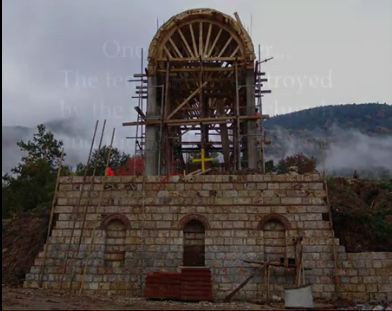 Construction of the Church of St. John Chrysostom near Bitola. Construction of the Church of St. John Chrysostom near Bitola. |  The ruins of the church after it was destroyed by the MOC and the government. The ruins of the church after it was destroyed by the MOC and the government. |
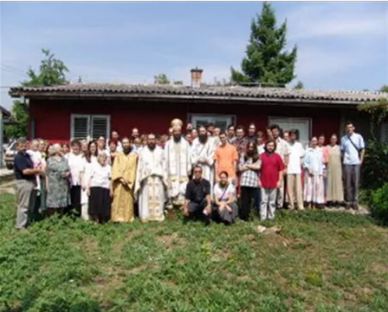 Archbishop Jovan with the faithful in front of the St. Nectarios Chapel in Skopje. Archbishop Jovan with the faithful in front of the St. Nectarios Chapel in Skopje. | 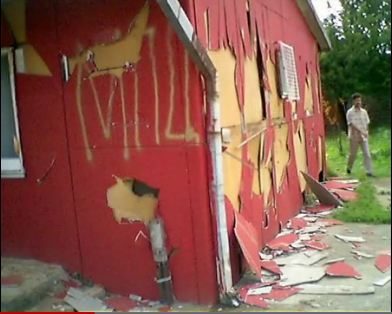 The chapel after vandalization by a mob from the MOC. The inscription says "MOC" (Macedonian Orthodox Church). The chapel after vandalization by a mob from the MOC. The inscription says "MOC" (Macedonian Orthodox Church). |
Since the time of Archbishop Jovan’s return to liturgical unity with the canonical Orthodox Church, he, his clergy and the faithful have been under continuous persecution by the state authorities. With each ensuing year these persecutions have worsened.
On January 11, 2004, armed police entered four monasteries of the Ohrid Archdiocese without warning and evicted the monks and nuns, leaving them standing outside their monasteries in the snow. The eviction was carried out in the middle of the night without a court order or explanation. On the same day Archbishop Jovan and a group of priests and monastics were arrested in a private residence for celebrating the Divine Liturgy in Bitola. When the police arrived in the middle of the Liturgy, Archbishop Jovan told them that “they could remove him only as dead from his place before the end of the Divine Liturgy.” After completion of the Liturgy the Archbishop, clergy and monastics were illegally held for thirty hours without food, water or sleep. Archbishop Jovan was then charged with instigating national, racial and religious hatred by celebrating the Divine Liturgy with his clergy.
Archbishop Jovan moved to his mother’s apartment in Bitola, turning one of its rooms into a chapel. However, armed gangs encircled the building, preventing the faithful from attending his services.
On February 20, 2004, five men armed with automatic weapons raided the St. John Chrysostom Monastery in the village of Nizhepole. They burned the monastery, attacked the two nuns who were present, and cut off their hair. The police never discovered the attackers, but some independent journalists conjectured that it was a raid by the State Agency for Security and Counterintelligence of the Republic of Macedonia.
On October 15, 2004, armed special police forces raided the Nizhepole monastery’s Church of the Life-giving Spring of the Mother of God, which was then under construction. With the aid of heavy machinery the police razed the church, which was under the jurisdiction of the Orthodox Archbishopric of Ohrid. The authorities pointed out that they had received seven requests from the local MOC bishop for the demolition of the church.
The most recent attacks [as of this writing] on the Ohrid Archbishopric occurred in July 2005. On Sunday, July 10, a drunken mob attacked Fr. Borjan Vitanov, a priest of the Ohrid Archbishopric, as he was arriving at the chapel of St. Nektarios of Aegina, in the Draeevo suburb of Skopje. The assailants pulled Fr. Borjan from his car, threw him down onto the street and brutally beat him, after which they demolished his car. They also hurt two parishioners who had come with Fr. Borjan.
Two days later, on the Feast of Sts. Peter and Paul, a crowd of about fifty people—led by the senior priest of the local MOC temple, Goran Karevski, together the board of the same church—arrived early in the morning at the St. Nektarios Chapel, before the Divine services were to begin, and with axes, hammers, spades and other tools they began to demolish the chapel. When the chanter Nikola, a man known for his humility, arrived at the chapel for services, the group beat him up. Later, when the clergy and faithful of the Ohrid Archbishopric arrived to celebrate the Feast, they too were brutally attacked. By this time a group of a hundred had gathered. Blocking access to the chapel, they continued to work to destroy it. The police only looked on and, as with the previous incident, arrested none of the assailants.
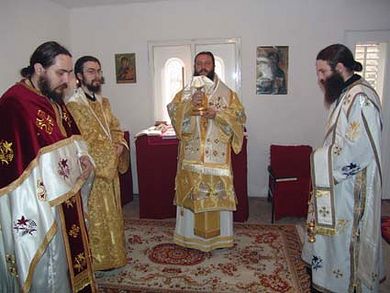 Archbishop Jovan serving Divine Liturgy in the St. Nectarios Chapel before its destruction. Archbishop Jovan serving Divine Liturgy in the St. Nectarios Chapel before its destruction. | 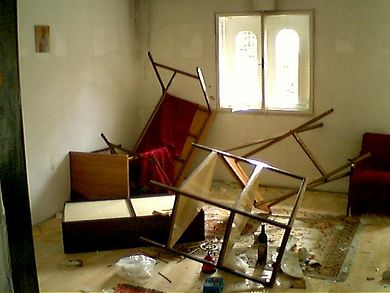 The desecrated altar of the St. Nectarios Chapel after destruction by the mob. The desecrated altar of the St. Nectarios Chapel after destruction by the mob. |
In addition to these extreme incidents, the Macedonian government has collaborated with the MOC to intimidate the clergy and laity of the Ohrid Archbishopric on a daily basis. Orthodox clergy are turned away at the borders, the government refuses to allow churches to be registered, the faithful are harassed with unwarranted searches of their homes, and Macedonian citizens who attempt to aid the clergy and monastics are threatened by the police. The police arrested and interrogated a certain Riste Risteski, who was suspected of merely having the intention of inviting some of the monastics of the Ohrid Archbishopric to live in his home. He was deprived of his right to have an attorney, denied food and water, and finally threatened with the words: “We will leave you without work, and we will leave your children without work! We will annihilate your family! Do you know who we are? We are the state; we can do whatever we want to you.”
7. The Imprisonment of Archbishop Jovan
After Archbishop Jovan’s arrest in January 2001, the court sentenced him to a pretrial detention of thirty days for celebrating the Divine Liturgy, writing an article in a church calendar, and submitting the names of two monks to Patriarch Pavle for consecration as bishops.[10] According to the court, all of these actions incited national, religious, and racial hatred.
In August of the same year a lower court in Bitola sentenced His Eminence to eighteen months in prison. In his closing statement at the trial His Eminence stated:
Under no condition, not even under much greater pressure from the authorities in the Republic of Macedonia, will we give up our Faith, Holy Orthodox Christianity, and may the Lord help us in this….
The Gospel, which I serve as a Bishop, as is widely known, spreads love, peace and unity.… The same teaches the ultimate aim, to love even our enemies. This has been my program of work since the first day of my ordination into the clerical rank, and it shall remain so until my last day. I declare that even if you imprison me or sentence me to death I will stay true to the Gospel I preach and live, but I also declare that in what I preach and live there is no instigation of hatred or intolerance of any sort.[11]
Two months later another Bitola court upheld the ruling. Then, in June 2005 a Macedonian court of appeals confirmed the verdict. Archbishop Jovan began serving his eighteen-month sentence on July 26, 2005. Then, in November of the same year, the court of appeals activated His Eminence’s suspended twelve-month sentence for baptizing his niece in a church of the MOC in Bitola, which the court said constituted a crime of “self-governance.” With this sentence added to his previous one, he is now serving a two-and-a-half-year term [as of this writing].
In his first days of prison Archbishop Jovan was kept under constant surveillance, and the prison authorities would allow him neither to wear his robe nor to bring anything with him to prison. According to Bishop Marko, “The Archbishop was not permitted to take his prayer book, the Gospels, an icon or any of the insignias of his rank with him.”
The universal Orthodox response to Archbishop Jovan’s imprisonment has been one of dismay. Still viewing the MOC to be an uncanonical, schismatic organization with which it is not possible to have any liturgical communion, all the Local Orthodox Churches throughout the world recognize the imprisoned Archbishop Jovan as a confessor of canonical Church unity, and they stand behind him in his suffering.
The Ecumenical Patriarch of Constantinople, His Holiness Bartholomew, wrote to the Prime Minister of Macedonia, Vlado Buchkovski, that the incarceration of Archbishop Jovan had “deeply saddened and puzzled us” and called for the “immediate release” of His Eminence.[12]
The Holy Synod of Bishops of the Serbian Orthodox Church expressed their “bitterness and shock upon this act of trampling of elementary and religious human rights.”[13]
The hierarchs of the Standing Conference of the Canonical Orthodox Bishops in the Americas (SCOBA) issued a statement saying that the Archbishop’s imprisonment was “an offence to all democratic societies and to all institutions and organizations dedicated to the protection and preservation of human rights,” and concluded by saying, “That a recognized, canonical hierarch can be sentenced to a year-and-a-half prison term for fulfilling his religious responsibilities is simply beyond our comprehension.”[14]
The Holy Synod of the Hellenic (Greek) Orthodox Church has issued an appeal to the Macedonian government expressing its “energetic protest” against the imprisonment of Archbishop Jovan: “This unacceptable treatment of the canonical Archbishop kyr Jovan is a clear violation of human rights and an inexcusable deprivation of a member of the Church of his right to freely carry out his duties.…We pray and we desire that the aforementioned Archbishop be immediately released, and that canonical church order be completely established in our neighboring country.”[15]
His Holiness Patriarch Alexey II of Moscow and All Russia sent a letter to Macedonian President B. Crvenkovski, calling for the release of Archbishop Jovan and affirming that differences with regard to the church order in Macedonia can be resolved only through church dialogue based on the holy canons.[16] Patriarch Alexey also wrote to His Holiness Patriarch Pavle of Serbia, assuring him that “We are praying fervently for the speediest release of our suffering brother, and for the healing of the wounds of schism and conflict in the Republic of Macedonia, which are painful to the entire Orthodox world, the manifestations of which, to our sorrow, have recently been doubled.”[17]
His Eminence Metropolitan Laurus of the Russian Orthodox Church Outside of Russia likewise wrote to Patriarch Pavle in support of Archbishop Jovan, who, he noted, “is now in a Macedonian prison for responding to Your Holiness’ call to actively seek to heal church division and for restoring communion with Your Holiness.”[18]
His Beatitude Metropolitan Herman of the Orthodox Church in America sent a similar appeal to Patriarch Pavle, stating, “We take our stand alongside the Holy Synod of the Serbian Orthodox Church in asking that all possible moral and legal actions be undertaken to secure the freedom of Archbishop Jovan. The prayers of the hierarchs, clergy, monastics and faithful of The Orthodox Church in America most certainly continue to be offered to God in hope and expectation of the healing of the schism which separates so many of the Orthodox people of the Former Yugoslav Republic of Macedonia from the Serbian Patriarchate and all the other canonical Orthodox Churches.”[19]
In addition, human rights groups have condemned the government’s actions. Sadly, none of this has had any effect, and Archbishop Jovan continues to sit in a prison cell in Macedonia.
In his only interview since being imprisoned [as of the date of this article], Archbishop Jovan said that he would not “beg the mercy of anyone but Our Lord Jesus Christ.…My example is insignificant. No one anywhere should be punished for having a different belief.… Each believer has to be prepared in advance to suffer for Christ, because He, being absolutely innocent, suffered for the salvation of us all.… I am prepared to leave prison immediately but also to remain for the rest of my life. That will not be decided by politicians or earthly courts. I do not put my faith in human rulers but in our merciful Lord Jesus Christ.”[20]
May God grant His Eminence Archbishop Jovan, together with the clergy and the faithful of the Orthodox Archdiocese of Ohrid, the strength and patience to endure these latest persecutions of Christ’s Church.
For more information on the Autonomous Orthodox Archdiocese of Ohrid, view its official website: http://www.poa-info.org
For updates on the persecution of Archbishop Jovan, view the “Free Archbishop Jovan” website: http://www.freearchbishop.com
© St. Herman of Alaska Brotherhood.From: The Orthodox Word, Nos. 242–243, 2005. Used with permission.

